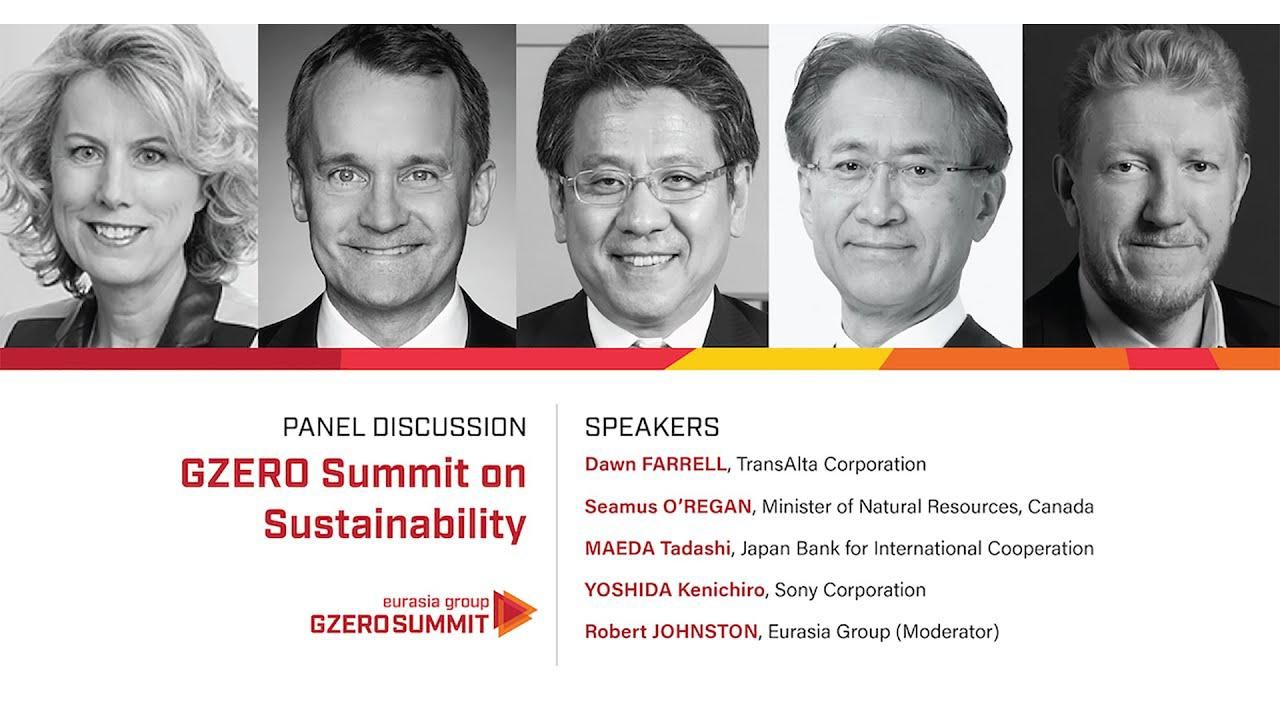GZERO Live
GZERO Summit on sustainability: COVID-19’s promise on ESG

GZERO Summit on Sustainability | GZERO Summit

The forced slowdown of global economic activity due to the coronavirus pandemic has slashed carbon emissions around the world, opening a unique opportunity to make real progress in the fight against climate change. But there is fear that it won't be enough, and the world will go back to its old ways when we get rid of COVID-19. However, even before the public health crisis, some major emitters had already taken ambitious steps to rethink how to make their own policies more sustainable.
In Canada, the prominence of oil in the economy doesn't mean that it should hide from the existential challenge of climate change. Fossil fuel profits make Canada not only more responsible but gives the nation the resources to commit to a bold climate policy, Canadian Minister of Natural Resources Seamus O'Regan said during a panel discussion on sustainability at the 2020 GZERO Summit in Japan.
Dawn Farrell, president and CEO of Transalta, Canada's largest clean electrical company, noted that we can apply many of the lessons learned from battling COVID-19 to the global struggle against climate change. The same way governments and the public sector have worked together successful vaccines, there must be equal collaboration on carbon prices, which must be set by governments and not the market alone.
Indeed, the pandemic is an opportunity to entirely transform the economy of countries like Japan, which recently committed to producing net zero carbon emissions by 2050 under new Prime Minister Yoshihide Suga.
Other nations with less muscle, though, may struggle to phase out highly polluting fossil fuels such as coal, which still powers dozens of countries across Asia. That's why rich countries should engage and help them, said Tadashi Maeda, governor of the Japan Bank for International Cooperation.
Meanwhile, countries with both the energy and financial resources to aspire to net zero in the near term should deliver on their Paris Accord climate commitments — and support businesses that are doing the right thing for their bottom line and the planet at the same time. For instance, O'Regan argued that Canada understands where the environmental, societal, and corporate governance (ESG) market is moving, for instance on liquefied natural gas.
ESG lately has become code for simply curbing emissions, but Farrell said that ESG investors want to know you can put your money where your mouth is, and show progress… without big disruption like calls for divestment. Indeed, for Maeda pulling back from all fossil fuels is only one aspect of ESG, and not even the most important right now in most emerging economies.
Beyond ESG investing, companies are also learning how to operate in more responsible way. One of them is Sony, a Japanese conglomerate which the Wall Street Journal recently ranked as the world's most sustainable managed corporation.
So, what's the key to Sony's success on sustainability? Dialogue with investors is crucial, explained Kenichiro Yoshida, the company's chairman and CEO.
With elected governments it's a bit different, but even then the way forward is changing our mindset. Farrell said that they are thinking less about who will be in power to set regulations, and more about the values of the people that put the politicians in power to come up with sustainability policies. If you know the people, you can predict how the governments they elect will act in the future.
Watch the above video to learn more insights from our panelists on COVID-19's impact on global sustainability efforts.
Of all the threats to the world, what are the top 10 most urgent global risks for 2026? On Monday, January 5, at 12 pm ET, join us for a livestream discussion with Ian Bremmer and global experts to discuss the Top Risks of 2025 report from Eurasia Group. This report will mark twenty years of Ian Bremmer’s annual forecast of the political risks that are most likely to play out over the year. Event link: gzeromedia.com/toprisks
Wikipedia cofounder Jimmy Wales explains why a specific page titled “The Gaza Genocide” risks undermining trust with users.
In his latest Quick Take, Ian Bremmer explains a major shift in the Ukraine war: Europe, not the United States, is now driving the strategy.
Chief Superintendent of the police force's National Security Department Steve Li Kwai-wah speaks at the West Kowloon Magistrates' Courts building after the verdict in the national security collusion trial of Jimmy Lai, founder of the now-defunct pro-democracy newspaper Apple Daily, in Hong Kong, China, on December 15, 2025.